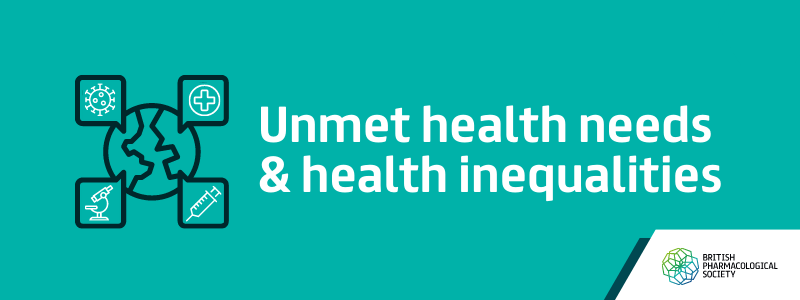Published: 15 Dec 2021
Category:

Pharmacologists work across the life cycle of drugs and therapeutics to understand how they work, develop better medicines, and ultimately to make a positive impact on health outcomes. An important consideration is how we deploy research, development, and care to where they are needed most - particularly in light of limited resources and global health challenges. That is why today, the Society is launching a new essay series focusing on health inequalities and unmet health needs.
Health inequalities and unmet health needs can arise for many reasons; from the societal inequalities that have arisen from historical injustice, socioeconomic disparity, from a lack of visibility - such as in rare diseases - and because of how disconnection between patients and researchers can lead to disconnection between research priorities and health needs.
This new essay series aims to create space for pharmacologists and the Society to listen to, learn from, and connect with, people with a diverse range of expertise and experience. We will be actively seeking the views of people outside of our usual networks. We will be asking our contributors to share their view of unmet health needs and inviting them to reflect on how pharmacology can help. We hope these essays will start important conversations about research priorities, and build on our membership of the Inequalities in Health Alliance.
We will be sharing essays on international public health issues and the importance of taking a multidisciplinary approach. Topics we explore in our series include mental health in marginalised communities, substance misuse, chemsex, Trans medicine, medicines for pregnant women - and more. We will also be collating content where it is relevant and helpful to consider a range of areas through a particular lens. We hope that using the Society’s platforms will support the fluid growth and evolution of the essay series. We also want to keep conversations alive, so we welcome your recommendations for topic areas and contributors.
This essay series is part of realising the Society’s vision for inclusive pharmacology: putting equity, diversity and inclusion at the heart of pharmacology, whether in terms of the opportunity for a successful career (in pharmacology or at the Society) or in benefitting from pharmacology research. The Society commits to capturing what we learn and exploring how to use our convening power through our education, meetings, journals and policy work to make an impact.
Inclusive pharmacology research means an inclusive approach to research practice and priority setting – from who we include and involve in research, to where we choose to direct limited resources. We invite you to explore the role of pharmacology in addressing unmet health needs with us, in the hope that this sparks new ideas for future research and collaboration.
Dr Anna Zecharia (Director, Policy & Public Affairs) and
Dr Margaret Cunningham (Editor in Chief of Pharmacology Matters)
On behalf of a Society working group, whose valuable input has helped shape this work:
- Emma Needham, Acting Communications Manager (British Pharmacological Society)
- Lenna Cumberbatch, Trustee for Equality, Diversity and Inclusion (British Pharmacological Society)
- Dr Aidan Seeley, Chair of the Early Career Pharmacologists Advisory Group (British Pharmacological Society)
- Dr Lilian Hunt, Equality, Diversity and Inclusion in Science and Health (EDIS) Lead (EDIS & Wellcome)
- Sarah Hesse, Editor (Pharmacology Matters)
Do you have an idea for a blog piece? Fill out our form and we will be in touch.
Read our launch essays:
-
Fraught decision-making in transgender medicine
- The importance of multidisciplinary approaches during public health crises
- Equitable access to HIV prevention and care
Read more essays in the series:
- Time to Deliver for Mothers and Babies: an urgent need for safe, effective and accessible medicines in pregnancy
- Living with HIV through menopause – we must do more to support women
- Chemsex and cultural competency
- Creating Culturally Competent Clinicians – a New Era of Inclusive Healthcare
- Menopause care: tackling misinformation and unmet need
See all of the articles in series
Comments
If you are a British Pharmacological Society member, please
sign in to post comments.